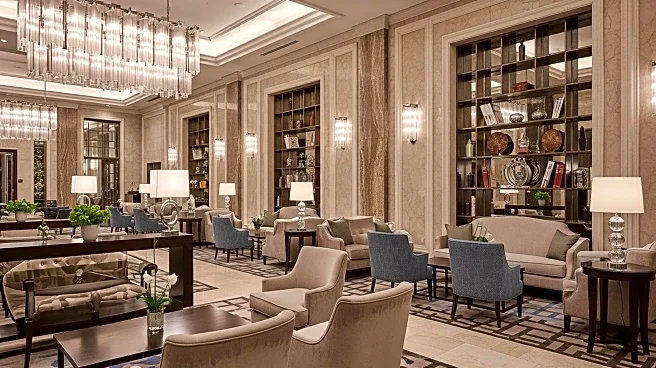What is the story about?
What's Happening?
Interior designers are emphasizing the importance of strategic spending in hotel renovations to create memorable guest experiences without exceeding budgets. The design process is broken down into phases: concept, design development, documentation, and construction administration, each with its own budget implications. Designers are focusing on creating authentic environments that reflect the locale and support operations, rather than opting for the flashiest or most expensive designs. This approach involves understanding client preferences through visual audits and aligning design goals with budget and schedule constraints. Successful projects often involve collaboration with vendors and careful planning to avoid costly mistakes during construction.
Why It's Important?
The strategic approach to hotel design is crucial for the hospitality industry, which is constantly evolving to meet changing guest expectations. By focusing on connection, experience, and authenticity, hotels can differentiate themselves in a competitive market. This method not only enhances guest satisfaction but also supports operational efficiency, potentially leading to better employee retention and reduced training costs. The emphasis on budget-smart design ensures that hotels can achieve high-quality results without overspending, which is particularly important in times of economic uncertainty. This strategy can lead to increased ROI through earned media and memorable guest experiences.
What's Next?
As travel behaviors and economic realities continue to shift, designers and hotel owners must anticipate future trends and adapt their strategies accordingly. This includes designing for flexibility and longevity, ensuring that spaces can evolve with changing needs. Collaboration between designers, contractors, and vendors will remain essential to executing successful projects. Hotel owners are encouraged to think beyond the opening day and focus on creating layered value that extends beyond initial impressions. The industry will likely see more emphasis on sustainable and cost-effective design solutions that prioritize guest experience and operational support.
Beyond the Headlines
The focus on strategic spending in hotel design highlights broader implications for the hospitality industry, including ethical considerations around sustainability and resource allocation. Designers are increasingly tasked with balancing aesthetic appeal with environmental responsibility, which may lead to long-term shifts in design practices. Additionally, the emphasis on authentic guest experiences reflects cultural trends towards personalization and local immersion, potentially influencing broader societal expectations for travel and leisure.















